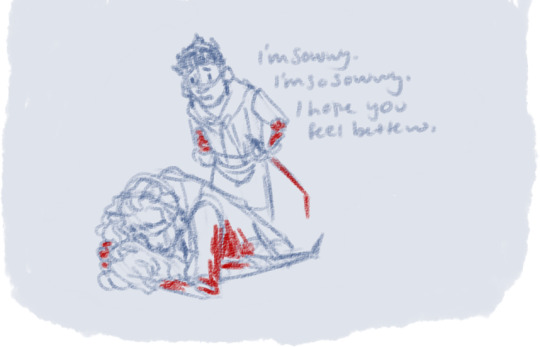#john/anastasia
Note
I saw a theory before that Anastasia was Johns literal daughter, and its why he stopped her from destroying her soul for the Paul lychtorhood, and while I dont believe that I will if it means it turns out Kiriona is her girlfriends (distant) aunt
hey anon have u read the two john/anastasia fics by darlingargents where she's his daughter? they're so fucking hot 😵💫
32 notes
·
View notes
Text
John Cusack, the voice actor for Dimitri in Anatasia (1997), shared his statement on Palestine 🇵🇸 🇵🇸 🇵🇸 🇵🇸
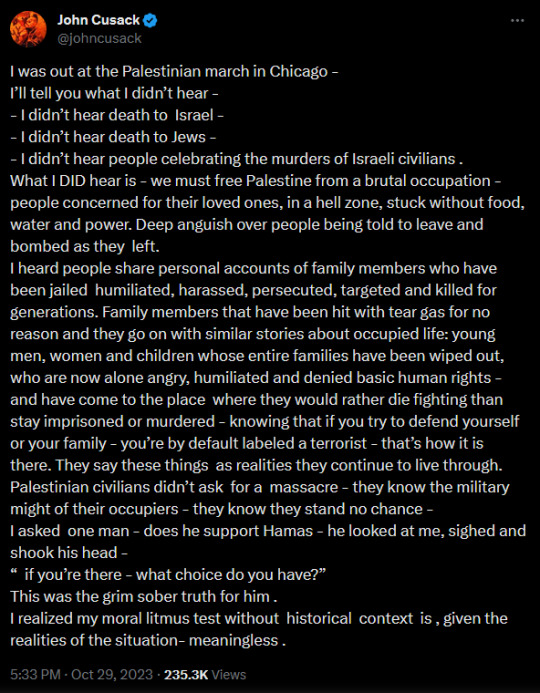
P.S. He has been a Palestinian supporter for years
#palestine#free palestine#gaza#free gaza#west bank#free west bank#“if you're there - what choice do you have?”#john cusack#anastasia 1997#israel#israel occupation#israel apartheid#anastasia#update to tags: yes i know he didnt just do anastasia but thats the one that stood out to me i love anastasia#the way everyone is like ok this is super serious topic but ANASTASIA??? is so amusing to me pls keep them coming#also please continue sharing about palestine!!!! FREE PALESTINE
33K notes
·
View notes
Text
'She’d researched it too much. Typical Anastasia. She’d seen some pathways in it that simply didn’t exist. She spoke the Eightfold Word, and it didn’t … work. After we—cleaned up—she asked me if I might end her life. Of course I said no. She had so much more to give.'

to the previous post cause I keep rotating this scene in my mind so much
#the locked tomb#anastasia the ninth#anastasia the first#john gaius#samael novenary#some of it#art#harrow the ninth#harrow the ninth spoilers#nona the ninth#alecto the ninth#gideon the ninth
4K notes
·
View notes
Text
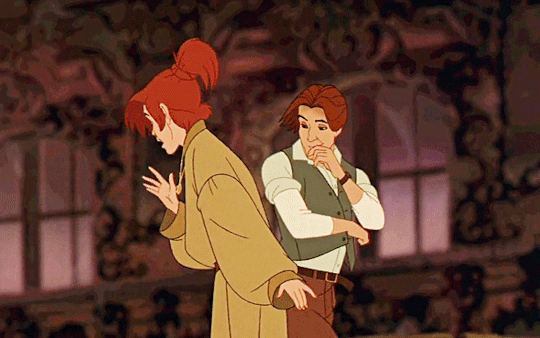
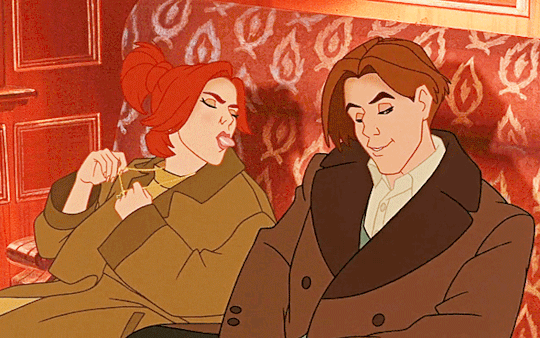
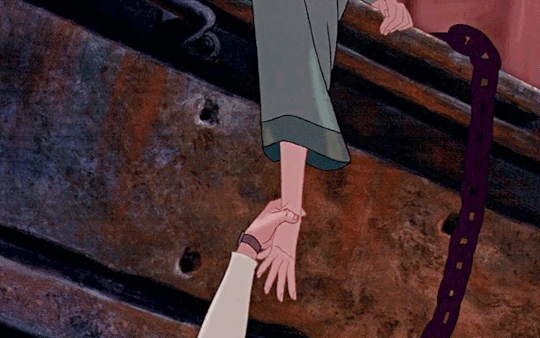
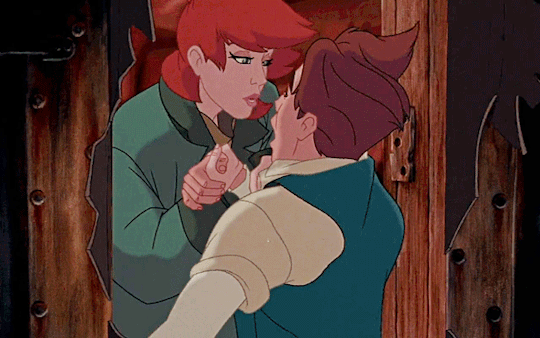




never dreaming what we'd have to go through now here we are, and i'm suddenly standing.....at the beginning with you
#second to the last gif is lowkey bothering me but what can i do lol#animation#animationedit#animationsource#animationdaily#movie-gifs#filmgifs#dailyflicks#filmreel#cinemapix#cinemasource#anastasiaedit#anastasia 1997#anya x dimitri#dimya#meg ryan#john cusack
859 notes
·
View notes
Text
"I’ve already pretty much revealed that Alecto begins with the descent of Christ into Hades."
- Tamsyn Muir
That's right...it's time for more Bible study for fans of weird queer necromancers!
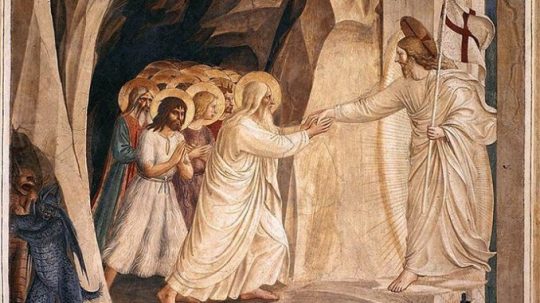
It's currently Holy Week, the week where Western liturgical Christians reenact the events of Jesus' death and resurrection in real time. And today, it's Holy Saturday. So Jesus died on the cross on Good Friday. He rises from the dead on Easter Sunday. But what happened in between? His body lay in the tomb...but his spirit was otherwise preoccupied. Because on Holy Saturday, Jesus went to Hell.
But why would Jesus go to Hell? Because the resurrection was not just about saving the people who came after it - it was a bit more...wibbly wobbly, timey wimey.
To be a bit more specific, he didn't visit Hell Hell. The place Jesus visited isn't Hell in the sense of eternal punishment of the damned, but Hades or Sheol or the Underworld or Limbo - a place for those who were mostly good but lived before Jesus' resurrection had made salvation possible. So before his resurrection, Jesus went to make that salvation retroactive. Particularly, according to tradition, to major figures from the Old Testament, including Adam and Eve.
So Nona the Ninth ended with Harrow walking off into the River in search of theological truth. And Alecto the Ninth apparently begins with Harrow in Hell:
Alecto the Ninth, ACT ONE
HARROW IN HELL
CHAPTER 1
At a point in the slit she was carving through life, Harrowhark Nonagesimus woke to find herself lost in a dark wound. She had been walking when it had all gone black– any path ahead or behind was blotted out; now she was here.
- Tamsyn Muir reading at TorCon
This is riffing heavily on the beginning of Dante's Inferno:
"In the middle of the journey of our life I came to myself within a dark wood where the straight way was lost."
- Dante Alighieri, Inferno
But lots of people go to Hell. What's so special about Harrow going there? Because the traditional name in English for Jesus' chthonic salvation adventures on Holy Saturday is "the Harrowing of Hell." "Harrow" comes from an Old English word meaning to attack or despoil - a very martial way of expressing the idea of Jesus as the victor over sin and death.
Harrow ended NTN realising that she cannot trust John's account of metaphysics. That she needs to discover the reality for herself. The faith of the Nine Houses and John's own styling as god rests on the foundation of the Resurrection - John is the "ransomer of death, scourge of death, vindicator of death", his power is understood to be absolute: "Let the whole of everywhere entrust themselves to him. Let those across the river pledge beyond the tomb to the adept divine."
And yet even that prayer - "let those across the river..." - introduces doubt. Magnus jumps in to silence Abigail when she expresses her heretical belief in the River beyond, and Harrow herself scoffs that "it has been thousands of years since anybody bothered to believe in the River beyond." Abigail believes that John knows nothing about what exists beyond the River. And what about Hell? In HTN, Ulysses the First is described as "languishing in Hell" after his run-in with a Resurrection Beast. John himself describes the stoma as "the mouth to Hell", "a portal to a place I cannot touch - somewhere I don't fully comprehend, where my power and my authority are utterly meaningless."
In the Book of Revelation - the Bible's account of the end of the world - Jesus holds "the keys of death and Hell". John may have resurrected the dead, but he does not comprehend what is beyond it. Both the destination of the good, the River beyond to which the souls of little Isaac and Jean should have traveled lightly after their short and brutal lives, and the Hell that lies beneath the stoma are outside of his power. He is a few keys short of the full divine bunch. He can manipulate death, but he is not really its master.
And so Harrow walks off into the River to look for something or someone she can call god. Harrow, who shares a name with the defeat of death across time and space. Harrow, who is of the unbroken line of Anastasia. Anastasia was kind to Alecto, who like Eve is the mother of all and like Adam walked on the empty earth with god.
In Orthodox icons, the Harrowing of Hell is depicted with Jesus triumphant, leading Adam and Eve by the hand from their tombs. The traditional term for this image is an anastasis, the Greek term for resurrection. Adam and Eve, whose sin broke the intended shape of reality, are restored to wholeness with god.
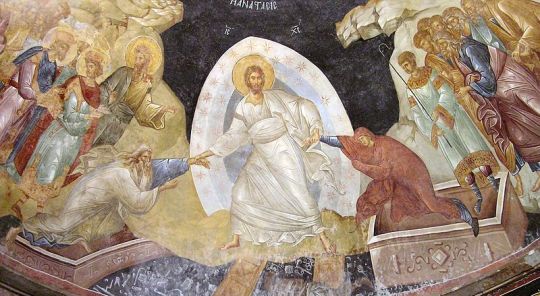
How will Harrow answer her questions about god? What really is beyond the stoma and what would it mean to conquer it? What does it look like, metaphysically, to restore the world of The Locked Tomb to wholeness, and what will it cost?
223 notes
·
View notes
Text







John 5:4 "What does it mean to love God?"
I loved this quote in Nona and it wasn't until I'd finished making this comic that I realized that Jod really didn't ever technically answer her question???
John Gaius is gonna girlboss gaslight gatekeep his way directly into the sun and I for one can't wait to see it
#my art#my comics#the locked tomb fanart#tlt fanart#tlt spoilers#griddlehark fanart#griddlehark#nona the ninth#lmao not gideon shaking harrow like an angry magic 8 ball#harrowhark nonagesimus#john gaius#the locked tomb#gideon the ninth#harrow the ninth#anastasia the first#alecto the ninth
142 notes
·
View notes
Text
John, Paul and Perfect Lyctorhood
Here's the thing: I think One Flesh, One End is the wrong way to think about what lyctorhood is, or at least, what it ideally should be.
Think about it: John never had his "cavalier" die for his lyctorhood. And yes, the reason for that is because he tried to consume the Earth's soul and it was too big for one human. But more importantly: this was non-consensual and one way.
Presumably most cavaliers (besides poor Babs) choose to die for their necros, so that's a step in the right direction. And then we have Paul - the death of two people, melding of two souls to create a third. But at the same time Paul didn't really feel like "the best" of Palamedes and Camilla, and mostly felt like a stranger (despite the fact that they clearly have their memories). Maybe they are too new and still have to discover these parts of themself, I don't know but I think we can all agree we didn't like it and I think that's the point. Pyrrha said Paul is not the end but just "a step in the theorem".
Personally, I'm most curious about what Anastasia was doing. According to John, she "freaked out and couldn't get the soul all the way in" and that's why he killed her cavalier, but how reliable of a narrator is John? We know he has a bias and is trying to make himself look better so personally I think that if he isn't outright lying (and we know he's not above that) there's probably more nuance to what he admitted.
So I would like to pose the following theory: Perfect Lyctorhood is not about one person dying for the other, not two people melding into one. Instead it's a process of exchange where both people take a part of the other 's soul in themselves consensually. They are both split and whole at the same time. And I believe (hope) that is what Gideon and Harrow will achieve by the end of the series.
#pyrrha dve#palamedes sextus#camila hect#camilla hect#john gaius#necrolord prime#alecto the ninth#gideon nav#harrowhark nonagesimus#anastasia the ninth#anastasia the first#gideon the ninth#harrow the ninth#nona the ninth#harrow the ninth spoilers#nona the ninth spoilers#htn spoilers#ntn spoilers#the locked tomb#the locked tomb meta#the locked tomb spoilers#tlt spoiles#tlt meta#griddlehark#griddlehark meta#ship: one flesh one end bitch#mine
498 notes
·
View notes
Text
I just can't shake the image in my head of Anastasia as a hyper-competent businesswoman (except the business is necromancy) with Samael as her hot young "personal assistant" type following her around fetching things she needs and getting her coffee (among, ahem, other things).
There's literally zero evidence for this mental image I've constructed of them, except that Jod killed Samael right fucking in front of her and still somehow assumed she cared so little about him that he trusted her to help him build not only literally the most holy and important tomb possible, but also the vault in which he planned to store his single source of power and immortality.
So as I was trying to reason out how the question of her loyalty never occurred to Jod, I guess I decided he just apologized for killing her assistant, offered to recommend some new hires and moved right on, totally missing the years long office romance they'd been carrying on.
#the locked tomb#tlt#tlt theoryposting#harrow the ninth#jod#john gauis#anastasia the first#samael novenary
73 notes
·
View notes
Text
Note: I'm writing this only because I haven't seen anyone else touch on these specific points. I'm not Māori, so my understanding may be mistaken; if so I would be very grateful for correction and elaboration from tangata whenua. (And I've only read Nona once so far, and we all know that's a scratch upon the surface of it.)
Tazmuir has received fandom flack for saying in interviews that Gideon and Harrow are both Māori without mentioning it in the text — which understandably reminds sf/f readers of a certain other author's tendency to dispose of the difficult bits outside the actual work. I think it is clear by now that the reason it wasn't dealt with explicitly earlier on is that Tazmuir sticks religiously (ahem) to the flawed and limited knowledge of her point-of-view characters, and in the Nine Houses they have no concept of pre-Resurrection races and ethnicities, because Jod has not allowed them knowledge of any world but his. (Besides, explaining Gideon's lineage in a Doylist aside would have been rather tricky without revealing, before their proper time in the narrative, juicy details about Jod himself.)
My prediction is that we will find out Anastasia was also Māori. Maybe, probably, from the same iwi as Jod and/or G1deon.
Which makes Harrow, her last descendent, Māori as well.
No matter how many generations separate them. No matter how much other blood.
"Mixed Māori" or "[percentage] Māori" is kind of a pākehā concept. The more important question is, do you whakapapa? Do you know who you are? Do you know where you come from? All it takes is one verified ancestor and you're in the club, no matter how long it's been or what brand of egg carton your skin looks like on the book cover. I think Harrow is descended not just from a line of Tomb-keepers but a line of kaitiaki, guardians of the land, who through Anastasia's private pact with Alecto are sworn to protect her — Papatūānuku, the earth mother born from salt water — and who have been holding on for ten thousand years to right Jod's wrongs. We know salt water is sacred to the line of the Ninth House; we know that Alecto was called "the saltwater creature"; we know that it's Nona's natural element, which calms and renews her; all this links Alecto/Earth specifically with Māori creation myths, more than any others. And we know that preserving the ancient bloodline of the Ninth, Anastasia's bloodline, in Harrow's own improbable and desperately yearned-for person (that Alecto can recognise at a taste), was the goal Pelleamena and Priamhark pursued at the cost of the Ninth House's entire future.
Yes, this series is portraying an indigenous man as the destroyer of Earth. We know that Earth chose him as her saviour and he betrayed her, imprisoned her, set himself up as master of an empire that was her antithesis, then imprisoned her again — arguably worse sins for someone who was born into that special relationship with the land, whom the Earth loved and trusted so much and still loves even now because love past understanding is her gift.
But here's the answer to that. Here's his opposite number. Harrow, who fell in love at first sight with the Earth, who found in that love her reason and her drive to continue living and to hold to her goals through intolerable trauma, who has a unique combination of bloodline and genius and Jod-and-Alecto-derived power (through her Lyctorhood with Kiriona Gaia, wherever that ends up going) with which to fulfill this sacred pact entered into by her tipuna Anastasia.
Harrow being Māori is not a trendy convenient afterthought. It's an integral point.
Harrow knows who she is. She knows where she comes from. She knows where she's going: Hell itself, to get to the bottom of all this shit. So I think we will be hearing more along these lines.
#the locked tomb#nona the ninth#anastasia the first#anastasia the ninth#harrow too#ntn spoilers#nona spoilers#nona the ninth spoilers#acid jail for john#because that is my tag for john
2K notes
·
View notes
Text
Kiriona said that if she killed Alecto, she would be John's cavalier. That's so interesting to me, because it's the one relationship we've never seen in a necrocav pairing. We've had siblings, lovers, cousins, best friends, coworkers, uncles, servants, and whatever the fuck Babs and Ianthe had going on, but never a parent and child.
Unless.
We still don't know what Samael and Anastasia's relationship was, but we do know now that Anastasia was already a mother before the ascension. Pyrrha painted a nursery for her.
It would be very interesting if Samael had been Anastasia's son.
#Anastasia and John are already set up to contrast#in being a long dead mythologised ancestor and a living relic set on nothing outliving him#so if John really did offer to make Kiriona his cavalier#and Samael was Anastasia's child#there is space for another fascinating parallel here in whatever Kiriona and John make of that offer next book#anastasia dedicated her death and her legacy to avenging her cavalier#she may even be responsible for sacrificing that legacy to create Harrow as a last-ditch pass at freeing Alecto#and if I'm right about that then there's a grim poetry to it#sacrificing every son and daughter of her House to avenge the son she refused to sacrifice#the locked tomb#ntn spoilers#kiriona gaia#anastasia the first#samael novenary#alecto speculation#tlt meta#emperor john gaius
425 notes
·
View notes
Text

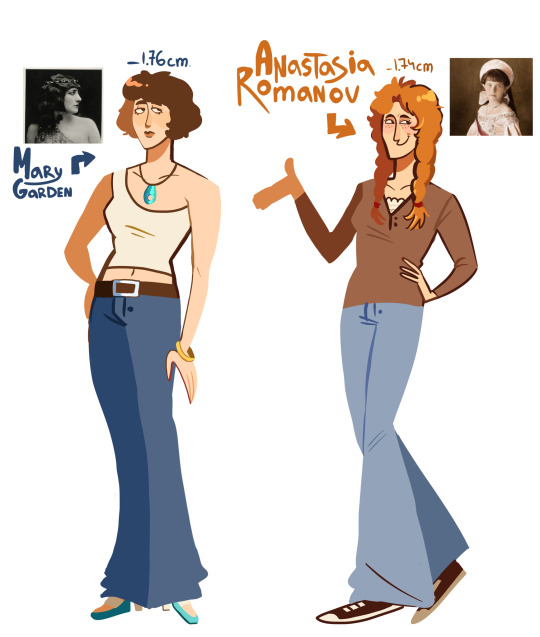


Fanclones!!!!
A little later I'll write down some information about them
#clone high#art#clonehigh#fan clone#freddie mercury#clone high oc#ch#ch oc#donna summer#john lennon#anastasia romanov#Mary garden#frank zappa#steve irwin
134 notes
·
View notes
Text
The Locked Tomb Series- Alecto Theory
Brace yourselves this is 3000 words of me connecting dots that aren't even there.
First things first, this post is an amalgam of various brilliant theories I have seen posted on Tumblr, so if anything feels familiar, that will be the main reason. I am just going to present my own take on this, and hopefully add something new to what we already have.
The subjects of today’s conspiracy theory are Alecto and Anastasia -and Cassiopeia in part, the vow to Anastasia’s bloodline and what could very possible be, Dios Apate MAJOR.
So let’s start with what we have from the books, and feel free to correct me or add sth I might have forgotten.
Anastasia and Samael are the only ones of the original Lyctor batch, that didn’t complete the Lyctorhood process, thanks to - in no small part – John, and/or possibly Alecto. (“I am sorry about Samael”). Which could mean that Alecto was somehow involved in the whole process going wrong, and thus she feels responsible for Samael’s death, or that she was close enough with Anastasia and Samael, that she herself felt Samael’s loss, or she felt for Anastasia’s grief. (I like to believe that they did have a tentative friendship even before the vow thing happened.)
Anastasia is also the only one of the Lyctors we know, so far, to have had children. Which is an important bit on its own, (Can full Lyctors, have children? If so, are they different from other children, necromantic or not? Is there a reason that in spite of biological capability- if it exists-the other Lyctors have chosen not to have children? Even with Augustine’s and Mercymorn’s plan we see that in the end Gideon is conceived with Wake’s material – John is a whole different story as far as Lyctorhood goes so he doesn’t count.)
Back to our discussion though, Anastasia’s bloodline was so important to the Ninth House that it has been preserved for 10.000 years. We do not really get a clear picture on whether the Reverend Family knows why the continuation of the bloodline is important, Harrow certainly doesn’t, but it was so deeply ingrained to them that Anastasia’s bloodline must remain intact, that they effectively committed genocide, dooming the House’s future, in order to produce one more direct descendant of the Saint that wasn’t.
We do get a hint, a rather big one, on why the preservation of Anastasia’s blood is so important, in Nona’s Epilogue. Alecto states that Harrow is “the blood of the tombkeeper” after kissing her and drawing blood. What did she taste on Harrow’s blood I wonder? And how did she recognize the taste, as the taste of Anastasia’s line? Did the vow she initially made to Anastasia herself involve them drawing blood? Did it bind them to one another, so deeply that they ingrained themselves into each other on a molecular level?
To add to this, young Harrow, young desolate Harrow, who had had enough with her life and was prepared to die, young Harrow who opened the Tomb for that express purpose, loves Alecto from sight. And decides to keep living for her. And there is something exceedingly weird to just how much Harrow loves Alecto. Alecto is probably the most attractive person Harow lay her eyes upon to that day, true, but this instant infatuation, and its persistence throughout the years has something more to it, don’t you think? As Gideon points out, both to herself and to Ianthe, Harrow’s heart belongs to the dead cold body in the Tomb. And said cold dead body in the Tomb, recognizes Harrow from sight when she wakes “Alecto recalled her, for it was a face once dreamed in Alecto’s dream.”
And this line begs the question. Could Alecto dream, in the tomb? If so, how? And what did she dream of? Did she dream of Harrow? Why did she dream of Harrow if that is the case? Or did she dream of Anastasia, and the resemblance is that great? On the other hand, if this refers to Harrow first opening the Tomb, and looking at Alecto, does that mean that she was in some form conscious throughout that stasis? Does this mean that she could have heard and felt Anastasia while they were both locked in the Tomb, for however long the other woman lived?
(The scene where Nona describes the feeling of Anastasia's hands in the water and feeling safe. I am going to cry.)
I do have an interesting theory about Alecto’s “dreams” but we’ll get there in a bit.
Something else that is fishy, is that the Ninth, is the House of the Sewn Tongue. It sounds a bit like too much flesh magic for a bone magic house to specialize in, right? The cure to the Sewn Tongue on the other hand? Removing the mandible and all that? That sounds like a Bone Magic solution to a flesh magic problem. And I wonder if the fact that the Ninth House’s emblem is the Jawless skull, insinuates that the Ninth is not so much a house where many secrets are kept – though this is undoubtedly true, as the Ninth is known as the House of secrets by the other houses – as much that in the Ninth, all secrets are revealed. Where the sewn tongue is healed, and the truth comes to light. And I’d like to point out that it sounds a bit like foreshadowing, and a promise. Anastasia has been betrayed by John and sworn to secrecy, and then locked in the Tomb to die and take his secrets with her. I feel like the jawless skull acts as a constant reminder, that even with the sewn tongue, all curses can be broken, and all secrets will eventually come to light. And it feels like a promise to John, that her House, the house of secrets and unspoken truths, will be the one to rid of the sewn tongue and bring the truth he so fears forward. And this aligns a tad too well with the Sixth’s mantra, Six for the truth, over solace in lies.
And you know what else fits here, in this concordance of the Sixth and Ninth Houses? Cassiopeia and Anastasia’s friendship. Their alliance if you will. We know they both worked closely together trying to figure out the perfect Lyctorhood process, and it is possible that Anastasia made her attempt a bit before Cassiopeia. The exact same attempt, that performed in perfect conditions ended in failure, with John ultimately killing Samael.
We also know that Cassiopeia left contingency plans in place, should the emperor become a hindrance to the empire. And from what we have seen of Cassiopeia in the books, it is safe to assume that she is driven, determined, exceedingly intelligent, perceptive, logical, and excellent at planning. She is also the one to point out John’s less than favorable qualities pre-Resurrection such as his interest in taking vengeance on those that wronged him being bigger in his interest to save lives.
So, we have, Cassiopeia and her logic driven, truth seeking brilliance, and Anastasia, the thorough, overly methodical researcher. We have them both working on perfect Lyctorhood, and we have them both, in one way or another, being betrayed by John. Chances are, that they were the first post Resurrection to notice John’s flaws, the first to concoct a plan against him. But contrary to Cytherea, Mercy and Augustine, they are more subtle than those cannonball attempts. No, I believe they planned. And they planned long term, and together. Cassiopeia left her House a note, left them instructions, she was preparing them for when John would become a liability. And then an aforementioned amount of time later, Anastasia is asked to design the tomb.
We do not really know anything about Alecto’s relationships with the other lyctors apart from the fact that most found her revolting, a “monster” in Mercy’s words. So here is a thought, perhaps Anastasia, the one of the original Eight to never ascend, perhaps the one whose failure Alecto was involved in – “I am sorry about Samael” – finds kinship in John’s unnerving pet, his undead “cavalier”, the one he betrayed first, the soul of earth. Perhaps they even became friends. Perhaps she and Cassiopeia realize the extend of what John has done and realize that Alecto is the key to undoing it. When John refuses to kill Alecto to appease the others, the plan fully forms.
So, they construct the tomb. And Cassiopeia is well-known for building mechanisms within houses, so maybe her and Anastasia create secret passages, and mechanisms with extra access to the tomb that would be independent of John sneaking in, or whatever he planned to do with that blood-ward. And hear me out, we know that Cassiopeia stayed 7 minutes in the river before being torn apart by the resurrection beast – at Mercymorn’s account at least, not sure how reliable of a narrator she is. But what happened during those seven minutes? Paul says he thinks he knows how to get to the Locked Tomb via the River. So, the river and the Tomb are connected. What did Cassiopeia do, I wonder? (Here I’d like to say that my other theory is that she did eventually die, or rather was consumed by Varun the eater, much like Judith Deuteros was. The RB burned through her in what, a couple months? How long would a Lyctor last? Perhaps that was the reason that Varun didn’t resurface until 100 years after Cassiopeia’s presumed death. She could have been alive and slowly wasting away, while still making failsafe within failsafe until she lost her sense of self and eventually wasted away)
To recap until now, the first part of my theory is that Anastasia and Cassiopeia dissatisfied with the world John had made and the truth he had served them, probably worked together to find the truth. And they worked together from the shadows, to create a plan, a long-term plan, with which they could bring John down if the need ever arose, and undo what he had done. And Anastasia’s bloodline and their secrets are really bloody important to that plan. (Also, some nice symbolism about the Ninth being about secrets revealed, rather than secrets kept, and that functioning as a bit of foreshadowing.)
Now into the second part of my theory. Anastasia’s bloodline is so important because she has bound her bloodline to Alecto. And I think this happened in the premise of the Vow Alecto has made to her, or they have made to each other. This might be part of the initial vow, of which we know nothing about, apart from the fact that Alecto pledged herself to Anastasia, and that it is important enough that she pledges herself to Harrow, or a failsafe within it. A failsafe to ensure that should Alecto wake after Anastasia has passed, she will not be fooled by any imposters, or anything else John might have planned. Or perhaps, a failsafe to ensure that even if John changes his mind and finds a way to rid of the body within the tomb, to “kill” Alecto, she will not be completely gone, she will keep existing within Anastasia’s line, thus ensuring that the plan for John’s demise can still be enacted and that the soul of the earth will not be dead.
That plays really hard in the Alecto is within Harrow from the beginning theory. And I will explain. I believe I saw something that looked like this in Twitter by lesbian_mothman, but I do not really remember so I apologize if all this has been said before.
In all the dream chapters with John, we relive memories from just before and after the resurrection, and John talks to Harrow as if she is Alecto “You always say that Harrowhark” as a response to “I still love you.” Or when Varun recognizes the Earth’s soul “green thing” within Nona in the car chase scene, or when Judith regaining consciousness asks “Harrowhark?” and Nona replies, “No, and I never was.” So that begs the question of how much of Harrow is Harrow, how much is Alecto and how much are the 200 souls within her? (And there was a crowd of dead children there. They were striving loudly against living children on the far-off shore of the tomb. CHILLS)
In Nona we learn that Palamedes and Camila on the one hand and Pyrrha on the other have two different theories about who Nona is. The Sixth believe that she is an amalgam of Gideon and Harrow, and Pyrrha believes she is Alecto, golden eyes and all. And I am more inclined to believe that it is indeed Alecto, or at least a part of her, that resides within Harrow, and took the wheel when both Harrow and Gideon were gone. Think abt it. Gideon is back in her body, and we have no idea what the hell happened to Harrow, only that she doesn’t have the wheel, and Nona acts nothing like Harrow or Gideon did. It’s like she is learning how to be human for the first time. She learns how to love and be loved for the first time. So with no soul to govern the body, the part of Alecto within Harrow takes the wheel.
And then there is the candle metaphor in NtN. Alecto’s soul is the candle passed from one necromantic heir of the Ninth to the other.
So long story short, part of the vow, if not all of it, is that part of Alecto will always live within Anastasia’s descendants, so long as they are necromancers. And here comes the part of Alecto’s dreams. Because if indeed she lives within the souls of Anastasia’s necromantic descendants, does she see through their eyes? Does she feel through their hearts? Does she dream of their lives, while locked in the Tomb, while a part of her lives in them? Is she conscious within them? Or does the whole thing act like a cavalier- lyctor sort of connection, where she cannot take the wheel unless the other soul in the body Is gone?
Part of her soul is bound to Anastasia’s line, and they are bound to her, and over the course of 10.000 years do they spill over? Alecto to Anastasia’s descendants and they to Alecto. Was this part of the plan to have a failsafe within Anastasia’s line in case something happened to the body in the Tomb? Was it a promise Anastasia made to Alecto, to give her a chance to live, to be human, through the lives of her own descendants?
All in all, I guess I could some it up in a few concise points.
Cassiopeia and Anastasia worked closely together, they were friends and allies and saw in John, the unfulfilled promises he made, and all the faults he tried to cover with rewriting his own version of history.
They decide to make a plan, a long term one, a detailed one, for when John is more a liability than it is worth. And thus, Cassiopeia creates the mechanisms in the Sixth and leaves the protocols for the rest to find. Truth over solace in lies.
Meanwhile Anastasia attempts to ascend, and John kills Samael. Alecto might be consciously or unconsciously involved and harbors guilt over Samael’s death.
Anastasia probably befriends Alecto or finds kinship with this strange being that is the soul of a planet that no longer is.
The planning continues and John after being asked to kill Alecto decides to lock her in the Tomb instead and has Anastasia design it. He later asks her to stay in the tomb and guard Alecto. (Antigone style)
Anastasia designs the tomb, probably with Cassiopeia’s help, probably with a few hidden mechanisms of its own and or a secret pathway through the river, an extra way out.
At some point, Anastasia sires a line, and she makes her vow with Alecto.
The vow probably is in regards of bounding Alecto to Anastasia’s line so long as there are necromantic heirs. A part of Alecto is constantly alive within each descendant of Anastasia’s.
It might work a bit like the lyctoral process, because Alecto only takes the wheel when there is no Harrow and no Gideon in Nona’s body, aka when there doesn’t seem to be another soul guiding it.
Alecto dreams. Whether she dreams of herself within the tomb and that’s how she recognizes Harrow on sight – from the memory of Harrow first unlocking the Tomb – or her dreams are glimpses of the lives Anastasia’s descendants lead I don’t know.
Alecto is thus bound to Anastasia’s line by blood. She recognizes Harrow by her blood, tasting either Anastasia, or the part of herself residing within it, when she kisses her. It also ensures that the line is intact the vow is intact and it’s not a pretender trying to fool her.
Anastasia and Cassiopeia planned to bring John down by opening the tomb when the time was right and leaving her to Alecto’s (and the RB’S???) mercy. There is still a lot left to be explored.
The tomb is to remain closed until the time has come God has to die. We can all see how that can be misinterpreted to > if the tomb opens God will die. And instead of a promise to be fulfilled it becomes a terrible terrible thing, that will spell everyone’s doom.
The freaking skull of the ninth is a threat, a foreshadow and a promise. The Ninth was a house that should have died with Anastasia in the tomb. But it didn’t. It continued existing its bloodline unbroken for 10.000 years. Nine for the tomb and all that was lost. The Ninth is predominantly I feel a house of mourning – the whole nuns, all black, and skull makeup thing. But it is also a house of secrets. It is a house represented by the cure to even the tightest secret held. So the Ninth, the house that should never have been the house that should have died with its secrets in the tomb of its inception, is the one that will break the sewn tongue, and reveal all the secrets, bringing the truth to light.

#the locked tomb#tlt series#tlt spoilers#alecto the ninth#alecto tlt#john gaius#tlt#alecto the first#anastasia the first#nona the ninth spoilers#cassiopeia the first#anastasia the ninth#harrow the ninth#harrowhark nonagesimus#harrow nonagesimus#lyctorhood#tlt fandom#fan theory#nona the ninth#You know what I cannot unsee the skull thing#It is a bloody symbol#And its bloody brilliant#alecto theory#my girls planned Dios Apate MAJOR#love them#it's all going to hell
133 notes
·
View notes
Text
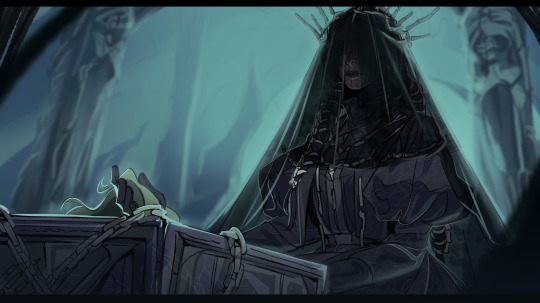
'Where is Anastasia? Let me talk to Anastasia'
I really like @/corvophobia idea that Anastasia also had a braid as same as Nona
also here's without a veil if someone interested
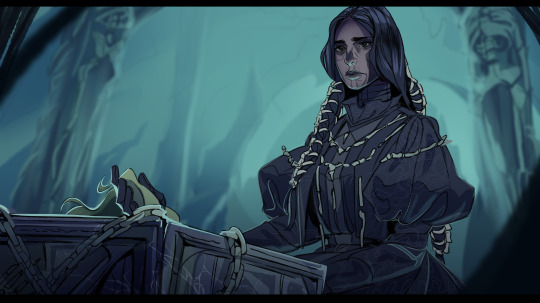
#also if im not wrong Anastasia was the one who helped designed the tomb but she wasn't there when John put Alecto there#so what's up with that John#the locked tomb#alecto the ninth#nona the ninth#harrow the ninth#anastasia the first#anastasia the ninth
4K notes
·
View notes
Text
#the locked tomb#tlt poll#gideon nav#kiriona gaia#harrowhark nonagesimus#ianthe tridentarius#alecto the first#john gaius#emperor john gaius#cassiopeia the first#nona the ninth spoilers#ntn spoilers#alecto the ninth#griddlehark#anastasia the first
467 notes
·
View notes
Text
I like lowkey need a Dick Grayson Anastasia au, is this bc im listening to the musical nonstop rn, maybe. But like imagine like the flying graysons dead, and like no one finds Dick Grayson’s body and the rumors are flying, and the circus is looking for him. Like bro Bruce could be Vlad, Babs could be Dimiitri. (and yes i know that would be wildly out of character for them) and they try to scam their way into the money prize with amnesiaed Dick Grayson, like for his whole not knowing his name like he could go by Damian (ik so funny). i would just love to see it.
#dc#dc comics#dcu#nightwing#dick grayson#the flying graysons#john grayson#mary grayson#bruce wayne#batman#barbara gordon#oracle#anastasia#alternative universe#fanfic#ao3#damian wayne#plot holes
67 notes
·
View notes
